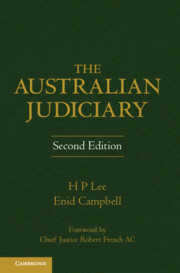Book contents
- Frontmatter
- Contents
- Preface
- Acknowledgments
- Table of Cases
- Table of Statutes
- Chapter 1 Introduction
- Chapter 2 The courts and judges
- Chapter 3 The judiciary as a branch of government
- Chapter 4 Appointment and conditions of service
- Chapter 5 Removal, suspension and discipline of judges
- Chapter 6 Judicial conduct
- Chapter 7 Extra-judicial activities of judges
- Chapter 8 Protecting judicial institutions
- Chapter 9 The accountability of judges
- Chapter 10 A public trust
- Appendix 1 Judicial statistics tables
- Guide to Judicial Conduct
- Index
- References
Chapter 7 - Extra-judicial activities of judges
Published online by Cambridge University Press: 05 December 2012
- Frontmatter
- Contents
- Preface
- Acknowledgments
- Table of Cases
- Table of Statutes
- Chapter 1 Introduction
- Chapter 2 The courts and judges
- Chapter 3 The judiciary as a branch of government
- Chapter 4 Appointment and conditions of service
- Chapter 5 Removal, suspension and discipline of judges
- Chapter 6 Judicial conduct
- Chapter 7 Extra-judicial activities of judges
- Chapter 8 Protecting judicial institutions
- Chapter 9 The accountability of judges
- Chapter 10 A public trust
- Appendix 1 Judicial statistics tables
- Guide to Judicial Conduct
- Index
- References
Summary
Non-judicial functions
The principal work of those appointed as members of courts is, of course, to adjudicate disputes and other matters that entail the exercise of powers which, for constitutional purposes, are described as being of a judicial character. However, in legal systems patterned after England’s, those appointed to judicial office have been authorised to exercise some powers that are not, strictly speaking, judicial in character. For example, when judges of a particular court assemble to decide what rules they should adopt regarding the practice and procedure of the court, they are acting primarily as legislators who have been delegated legislative powers by the relevant parliament.
Traditionally, the powers accorded to judges have included authority to grant warrants to law enforcement officers, such as officers of police, to search premises and seize material found there that may be relevant to the investigation of criminal activities. But Australia’s High Court has ruled that the function of deciding whether a search or similar warrant should be granted is not, essentially, a judicial function; rather, it is an administrative function. In recent times, the High Court has held that the function of making a control order by a federal court pursuant to federal legislation is a judicial function.
- Type
- Chapter
- Information
- The Australian Judiciary , pp. 186 - 206Publisher: Cambridge University PressPrint publication year: 2012

